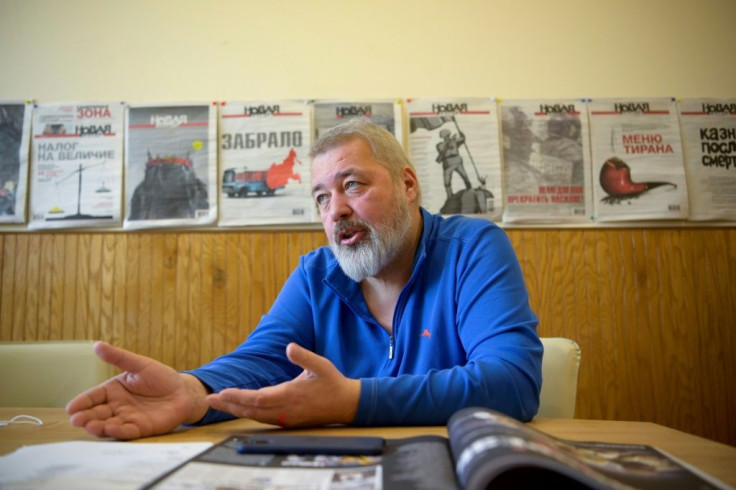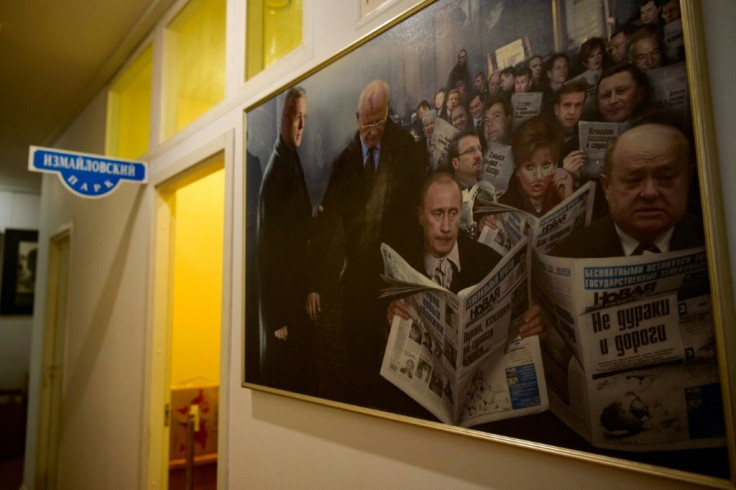Russian Newspaper Fights On Despite Threats And Attacks
Captured on a CCTV camera late at night, a man on a bicycle with a food delivery backpack approaches the offices of Novaya Gazeta, Russia's leading independent newspaper.
In the grainy footage recorded in central Moscow earlier this month, the man sprays an unknown substance at the newspaper's front door, then slowly walks away, careful not to look up at the camera.
Sitting in the offices a few days later, editor-in-chief Dmitry Muratov tells AFP he has no doubt the "chemical attack" was the latest attempt to silence one of the few media outlets in Russia willing to challenge the official line.
"This is the use of military-grade non-lethal poisonous substances to warn the paper's staff or as revenge on them," says Muratov, a grey-bearded 59-year-old who since 1995 has served several times as Novaya Gazeta's editor-in-chief.
Several employees felt unwell after the attack and it took days of cleaning to get rid of the horrible stench, with the strip of pavement that was sprayed having to be removed.
It was hardly the first attack on Novaya Gazeta, and far from the worst.
Since the early 2000s, six Novaya Gazeta journalists have been killed in connection with their work -- their black-and-white portraits now hang together in the newspaper's office.
"It's no secret that when they killed Anna Politkovskaya I wanted to close this newspaper... This newspaper is dangerous for people's lives," Muratov says.

Politkovskaya, who spent years reporting for Novaya Gazeta on rights abuses and the Kremlin's war in the North Caucasus region of Chechnya, was shot dead outside her apartment in 2006 at the age of 48.
"The newspaper's journalists were categorically against this, they believed we would violate the memory of Anna Politkovskaya if we closed down... They convinced me," Muratov says.
Muratov was among a group of journalists who founded Novaya Gazeta in 1993, inspired by the newfound freedoms that followed the collapse of the Soviet Union.
One of their key early supporters was former Soviet leader Mikhail Gorbachev, who donated part of his 1990 Nobel Peace Prize money to buy the new publication its first computers -- one of them still on display in their office.
The heady optimism of those early days is long gone. In the years since President Vladimir Putin came to power in 1999, critical voices have been increasingly pushed to the sidelines in Russia.
But Novaya Gazeta soldiers on, publishing three times per week with reports on rights abuses and corruption despite repeated attacks.
In 2018, its office received an unusual delivery of a funeral wreath and a severed ram's head with a note addressed to Denis Korotkov, who covers the Wagner mercenary group.

His investigations have shed light on Wagner's operations abroad and on its alleged ties to a Kremlin-linked businessman, Yevgeny Prigozhin.
Korotkov tells AFP that despite these "gifts" and false articles written about him over the years, he does not plan to stop his work or leave the country.
"It is quite difficult to do journalism about Russia from outside Russia," he says, wearing his signature round sunglasses and smoking a pipe.
If every reporter who wanted to write the truth left Russia, he says, "we would then have a lot of single-use journalists in Russia."
"You write one controversial story and then you leave. You can have a whole colony somewhere."
More recently, the paper faced a backlash over a report on detentions and extrajudicial killings in Chechnya based on the testimony of a former policeman.
Days after publication, a regiment of Chechen police, rifles in hand, published a video addressed to Putin, accusing the paper of "vile attacks" on its members and saying they felt forced to "stop the insults".
The investigation's author Yelena Milashina has been writing about Chechnya for close to two decades and says she never thought about quitting the job.
Three years after Politkovskaya was killed, rights activist and Novaya Gazeta contributor Natalia Estemirova was abducted from her home in the Chechen capital Grozny and later found dead with a bullet in her head.
Milashina says the only way to stand against these kinds of attacks is for journalists to keep working.
"So that the people who killed my colleagues understand that there will be another journalist who will continue doing their job."
Faced with this kind of pressure, many independent journalists have left Russia to set up operations elsewhere.
But Muratov says he is optimistic that Novaya Gazeta will be able to stay relevant and continue reporting from on the ground, thanks to "huge audience support" from its readers.
The paper has a print edition of 90,000 copies and its website is visited by around 500,000 readers every day.
"We're not going anywhere... We will live and work in Russia."
© Copyright AFP 2024. All rights reserved.





















